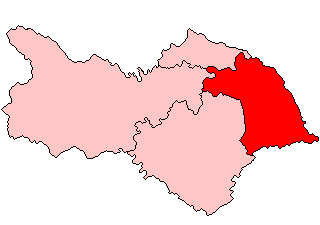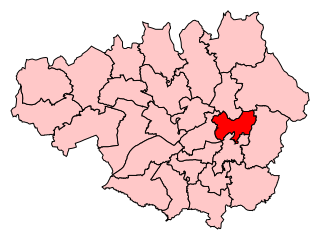The Ashton-Under-Lyne by-election of 1931 was held on 30 April. It was triggered by the death of the town's Labour MP, Albert Bellamy, and resulted in a victory for the Conservative candidate, Col John Broadbent.
Albert Bellamy was an English trades unionist and Labour Party politician.
Contents
This was the first election contested by Oswald Mosley's New Party, which had only been formed on 1 March that year after Mosley had resigned from the Labour Party. The furious crowd on the market ground by the town hall shouted down Mosley as he tried to speak after the declaration, calling him a traitor and blaming him for Labour's defeat. He is reputed to have said to his aide, John Strachey: "That is the crowd that has prevented anyone doing anything in England since the (First World) War." Strachey believed that it was at that point that British fascism was born.

Sir Oswald Ernald Mosley of Ancoats, 6th Baronet was a British politician who rose to fame in the 1920s as a Member of Parliament and later in the 1930s became leader of the British Union of Fascists (BUF). Mosley had inherited the title 'Sir' by virtue of his baronetcy; he was the sixth Baronet of a title that had been in his family for centuries.

Evelyn John St Loe Strachey was a British Labour politician and writer.
Mosley had been seriously ill with pleurisy and pneumonia, preventing him from taking part in the campaign until its last week. During the campaign there were huge crowds to hear Mosley's wife, Lady Cynthia, speak. However, the Ashton Reporter felt that these were artificially swelled by the many girls who wanted to admire the clothes worn by the glamorous Lady Cynthia.
The Labour Party hoped to hold the seat, and narrowed its choice of possible candidates to two: Stan Awbery, an activist in the Transport and General Workers' Union, based in Wales, and John William Gordon, an Irish-born Catholic who was chief accountant of the National Union of Railwaymen. Concerns that the substantial number of Catholics in the seat might have become disillusioned with the party led to the selection of Gordon to contest the seat. [1] [2]
Stanley Stephen Awbery was a British trade unionist and Labour Party politician.

The Transport and General Workers' Union was one of the largest general trade unions in the United Kingdom and Ireland - where it was known as the Amalgamated Transport and General Workers' Union (ATGWU) to differentiate itself from the Irish Transport and General Workers' Union - with 900,000 members. It was founded in 1922, and its first general secretary was Ernest Bevin.
John William Gordon was an Irish trade union official and political activist.



